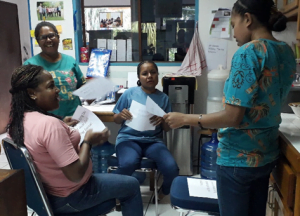Papuan Malay Literature Development – $37,000/yearTax-deductible
Project Description
This project will build capacity in Papuan writers, by providing quality training and mentoring as they create and promote Papuan Malay (PM) materials and contribute to language development efforts in the region.
PM native speakers (currently five employees of TPMP) will be mentored as writers by an SILA linguistics consultant (and others), as they translate culturally significant sacred texts, and author other relevant titles including pre-and early literacy curricula and health materials. These writers will receive ongoing mentoring, including annual, face-to-face, practical linguistic training, and will carry out sociolinguistic research and community consultation as they field test and promote the materials. These writers will make a direct contribution to the cause of education and development in Papua and West Papua, Indonesia, supporting the educational aspirations of those who are disadvantaged in the current educational system
Click the link below to learn more or to support this project.
Linguistics Consultant Resourcing of PNG (LingCrop) – Papua New Guinea $20,000/yearTax-deductible
Project Description
The LingCrop (Linguistics Consultant Resourcing of PNG) project was launched in August 2021.
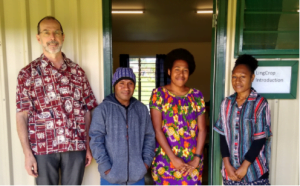
Photo credit: René van den Berg
LingCrop is a three-year mentored program of training for well-educated Papua New Guineans to become linguistics consultants with SIL-PNG or Bible Translation Association of Papua New Guinea (BTA). This project is designed to build capacity in PNG linguistics graduates, by providing employment, training, mentoring and linguistic field experience so that they can contribute to language development efforts in PNG and possibly in the region. The participants in this program will make a direct contribution to the cause of education and development in PNG. The services they provide will include basic language documentation, orthography development, and research on linguistics factors relevant to literacy, education, teacher training, and the translation of important information including health literature.
Click the link below to learn more or to support this project.
Overseas Student Support Fund – Raising up a new generation of Language Development Leaders
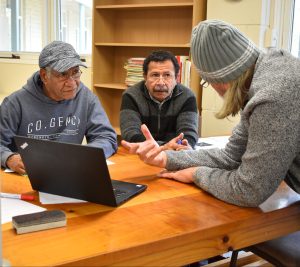
Project Description
SILA in collaboration with BTA in Papua New Guinea trained two Papua New Guinea translators in a 1-year diploma in 2019.
This project aims to support others from Pacific Island countries in undertaking diploma and graduate diploma studies.
Click the link below to learn more or to support this project.
Completed Projects
Click the arrows on the left to expand each project
Mayoyao mother-tongue based multilingual education Project – Philippines – $96,920Tax-deductible
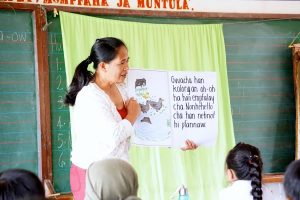
Project Description
This project built capacity in national teachers by supporting them to develop teaching principles and reading materials in their local Mayoyao language. These materials are being used to help students from Kindergarten to Grade 3 develop foundational literacy skills in their local language before also acquiring the national languages of Filipino and English.
Sixty teachers participated in a series of workshops over three years (2017-2019) to create reading materials and other literacy resources in the Mayoyao language. Project funds were used to provide stationery materials and access to literacy trainers who offered technical advice as teachers created reading texts. These materials were then made freely available to other schools, with workshop teachers equipped to train colleagues in using and creating their own texts to enhance student literacy and learning.
China Minority Education Project – Partnership Phase – $50,607
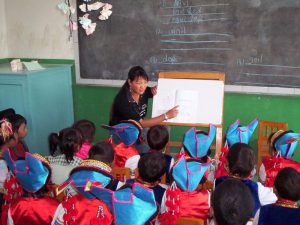 Project Description
Project Description
This project built on the lessons learned through the successful implementation of the Bai minority language education program, by establishing an educational capacity building partnership in Yunnan province. The project aimed to help with the building of strategically located university-based centres of expertise in the early educational needs of remote minority children, and saw those centres leverage their own experience to spread positive outcomes to children in many remote rural communities in China.
China Minority Education – bridging the gap Project – $213,640
Project Description
The aim of the China Minority Education – Bridging the gap (ChiME-btg) project was to facilitate the establishment of an educational capacity building partnership in China’s Yunnan Province. The purpose of this partnership was to encourage the development of mother tongue-to-national language transition minority language education programs in remote rural areas. The project aimed to:
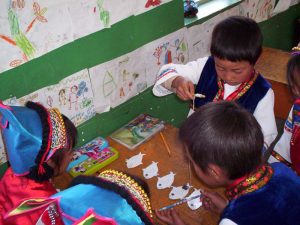
- strengthen the existing Bai bilingual education pilot program to a demonstration school level
- build a ChiME partnership among multiple Yunnan agencies
- establish a Friends of ChiME network in Australia to help support the project
- complete national registration of the preschool curriculum and publish academic papers foundational to the curriculum.
The ChiME-btg project was approved in July 2014 and operated for three years. It was supported by SILA consultants Dr Brian and Dr Liz Billard, co-founders of the Bai bilingual education program established in Yunnan Province in 2006 after several years of preliminary work.
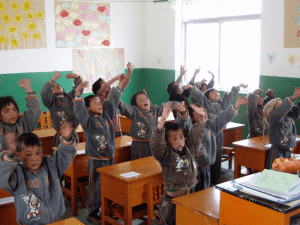
Rationale
For ethnic minority children living in remote parts of China, starting school without being able to speak Chinese means that the issues of poverty and remote location are compounded by a huge language barrier. A pilot bilingual preschool education program addressing these issues was started amongst the Bai people in Shilong village, Jianchuan County. The program incorporated modern teaching techniques contextualised to the cultural and rural environment and it was successful in providing Bai, Yi and Lisu children access to education in Chinese at the local primary school. These children, who would otherwise have struggled to attend or to perform in school, outperformed other children in the district. The Bai program began running semi-independently in 2009.
Local and provincial authorities were keen for the pilot program to continue to develop, with opportunities for replication in other dialect areas and minority language groups. In 2013 Yunnan authorities asked Brian Billard to assist in charting a way forward. The outcome of these discussions was a vision for a wider educational partnership addressing the needs of remote minority education in rural China, by building Yunnan level capacity for wider ‘mass’ replication and development of such programs in other minority areas. The vision presumed the achievement of sustainability through increasing national funding commitment, but there was a need through the development stages for international engagement and funding support.
Chad Massalit Literacy Project – $51,242
Project Description
Click here for resources on learning to read and write in the Massalit language
The Massalit Literacy Support (MLS) project facilitated the development and distribution of appropriate Massalit literacy teaching and learning materials for 4th and 5th grades in the schools in refugee communities in Eastern Chad. The project also funded the development and distribution of class and community library kits. In the process, teachers were trained to use the materials and some of them were selected and mentored as trainers and supervisors to run training programs independently in the future. 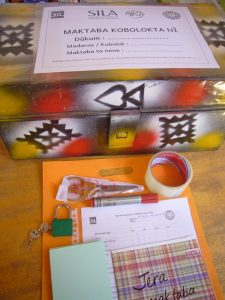 The goal was that Massalit children and their families learn to read and write in their mother-tongue, a process which helps facilitates literacy acquisition in the national language and also affirms their intrinsic worth as unique and precious. The Massalit support project ran from July 2013 until mid 2016, supported by SIL workers in Chad.
The goal was that Massalit children and their families learn to read and write in their mother-tongue, a process which helps facilitates literacy acquisition in the national language and also affirms their intrinsic worth as unique and precious. The Massalit support project ran from July 2013 until mid 2016, supported by SIL workers in Chad.
Rationale
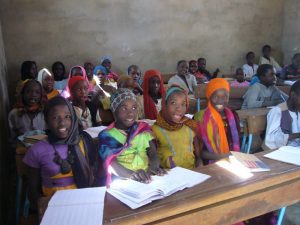 Having fled their homes in the West Darfur region of Sudan, the Massalit refugees in eastern Chad were trying to build the semblance of a normal life as they waited to return home. Traditionally subsistence farmers with little access to education, they are now highly motivated to become as educated as possible, while also preserving their language and culture. Many children, boys and girls, attended primary school in the refugee camps, while youths and adults attend community literacy classes. There was a huge thirst for learning, and for the Massalit literacy classes in the primary schools and in the community that helped meet the felt needs of the refugees.
Having fled their homes in the West Darfur region of Sudan, the Massalit refugees in eastern Chad were trying to build the semblance of a normal life as they waited to return home. Traditionally subsistence farmers with little access to education, they are now highly motivated to become as educated as possible, while also preserving their language and culture. Many children, boys and girls, attended primary school in the refugee camps, while youths and adults attend community literacy classes. There was a huge thirst for learning, and for the Massalit literacy classes in the primary schools and in the community that helped meet the felt needs of the refugees.
Solomon Islands Literacy Project 1 – $95,000
Project Description
The goal of this project was to help develop capacity of Solomon Islands communities to improve their own people’s literacy skills. Workshops were conducted to train participants from more than 12 language communities to develop and use instructional materials for use in small learning circles. LASI staff and language community representatives were trained and encouraged to continue to produce local language literacy materials. The project ran from February 2008 – 2011 and involved staff from SIL Australia and the Solomon Islands Translation Advisory Group (SITAG).
Solomon Islands Literacy Project 2 – $62,362
Project Description
The focus of this project was to build increased capacity for literacy training and materials development in two Non-Governmental Development Organisations (NGDOs) – the Literacy Association of the Solomon Islands (LASI) and the Solomon Islands Bible Translation and Literacy Partnership (BTLP). The project built on an earlier project (run from 2008 to 2011) which provided assistance to more than 12 language communities in developing instructional literacy materials for adult literacy classes and groups. The work with LASI focused on developing a suggested framework for a total adult literacy program, developing relevant monitoring tools and further developing training programs and materials to support the implementation of such programs. The work with BTLP delivered further training to eight literacy projects commenced under the earlier project and expanded training and materials production to 2-4 new community language literacy programs.
Rationale
The huge need for and increasing interest in adult literacy in language communities in the Solomon Islands meant that LASI and other NGDOs were unable to respond to all the requests for assistance to establish community literacy learning circles. This project helped LASI develop additional literacy materials, streamlined the training program, developed manuals for initial training workshops and helped with the development of monitoring tools such that the work of LASI could be strengthened and extended. In addition the project provided additional training to eight existing BTLP literacy programs by assisting with the development of more literacy materials and more training in teaching and in developing literacy materials using computers. The project also began the training and development of materials for four new community language literacy teams. SILA consultants supported the project by visiting Honiara at least twice each year of the three-year period to run training sessions and workshops and assist with materials development. Consultants also helped with preparation of materials and gave support between visits via email
Nepal – Tharu and Limbu language literacy materials $6,000
Project Description
This project was based in two rural areas in Nepal – the Limbu-speaking area in the east, and the Tharu-speaking area in the west of the country. It provided vernacular reading materials for the local non-formal education activities among the Tharu and the Limbu people of Nepal
Funds from Australia through SIL Australia helped cover the costs to prepare and publish calendars and a variety of basic reading materials in the two local languages. These materials were integrated with non-formal education activities and income generating efforts that were operating within these communities as part of a wider development effort at the time.
Papua New Guinea – Agarabi Community Centre $16,665
Project Description
This project provided a central resource location for children’s education and literacy development by funding the building of a Community Centre for the Agarabi community of Papua New Guinea. The Centre is used as a place where people gather for development of their own language materials, including a dictionary and reading materials to encourage and facilitate literacy development. In addition, it provides a central location for teaching primary health care, a strong felt need, and for treating of non-critical health problems.
Papua New Guinea – Ama language literacy materials $4,575
Project Description
This project sought to provide the means for children and teenagers in the remote Ama language area of PNG develop literacy skills in their own language, and then apply these skills also in Tok Pisin, a national language of PNG.
Several SIL translation teams and local people developed thirty-seven teacher’s manuals (‘big-books’), 3 primers and a storybook. Local literacy teachers were trained to use the materials. Funds from SIL Australia paid for printing the three primers and the storybook, and their transport to the language area.

